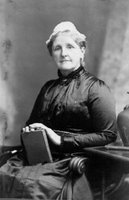 In 1875, Hannah Whitall Smith (pictured at right) published what has become a classic in Christian literature entitled The Christian’s Secret of a Happy Life. Despite the many difficulties she faced as a woman living in the late 19th century, she was able to put down on paper many of the things she learned in the face of what seemed to be one valley experience after another. Consider just some of the tragedies she faced: In 1857, her first child named Nellie died from bronchitis. In 1872, her second child named Frank died of thyphoid fever. Her husband, Robert, suffered three mental and nervous breakdowns in the space 15 years and in 1875, reports began to circulate about his martial infidelity. All of this occurred while she tried to care for her children, live through the American Civil War, nurse her husband back to health, and at the same time was involved in writing numerous books about how to successfully live the Christian life.
In 1875, Hannah Whitall Smith (pictured at right) published what has become a classic in Christian literature entitled The Christian’s Secret of a Happy Life. Despite the many difficulties she faced as a woman living in the late 19th century, she was able to put down on paper many of the things she learned in the face of what seemed to be one valley experience after another. Consider just some of the tragedies she faced: In 1857, her first child named Nellie died from bronchitis. In 1872, her second child named Frank died of thyphoid fever. Her husband, Robert, suffered three mental and nervous breakdowns in the space 15 years and in 1875, reports began to circulate about his martial infidelity. All of this occurred while she tried to care for her children, live through the American Civil War, nurse her husband back to health, and at the same time was involved in writing numerous books about how to successfully live the Christian life.In the beginning of her classic book, she sets forth her firm conviction that it is “a settled point that the Scriptures do set before the believer in the Lord Jesus a life of abiding rest and of continual victory” (p. 21). From this point, she goes on to describe how such a life is possible. To understand what Hannah Smith had learned, it is best to quote her directly. Here are four quotes that reveal the depth of her experience and what she learned:
· “You must hand yourself and your inward experiences, your temptations, your temperament, your frames and feelings, all over into the care and keeping of your God, and leave them there” (p. 22).
· “In order for a lump of clay to be made into a beautiful vessel, it must be entirely abandoned to the potter, and must lie passive in his hands…Perhaps to some minds the word ‘abandonment’ might express this idea better. But whatever word we use, we mean an entire surrender of the whole being to God” (p. 30,31).
· “What is needed, then, is to see God in everything” (p. 68).
· “You will find that such souls are not engaged in watching self, but in looking unto Jesus…Self-effort and self-dependence are at the end with them. Their interest in self is gone, transferred over into the hands of another. Self has become really nothing, and Christ alone is all in all to such as these” (p. 85).
This life of victory that Smith highlights does not mean the absence of problems or difficulties, but rather, it refers to the ability (by God’s grace) to continue steadfastly in the purpose God has for one’s life. Essentially the life of victory is receiving God’s strength – His ability – to face all the trials of life and still carry on. And so, Hannah Smith’s four simple principles ring out loud and clear:
1. Turn all your concerns, problems and difficulties over to the care and keeping of God – and leave them there!
2. Surrender yourself on a daily basis to the Lord God Almighty – who is well able to look after you.
3. Believe that no matter what you face in life, God is in everything.
4. Turn the focus of your attention away from yourself and your own needs to the Person of Christ and His purpose for your life.
2 comments:
Fantastic. We had a class this week on the breaking of bread. It really is all about looking at Jesus and recognizing his centrality, that it is his victotry and that he lives in us!
(I am continually impressed by your ability to blog almost daily)
I read this book during a very difficult time and it really encouraged me. Knowing more details of Hannah's life makes this book all the more encouraging.
Post a Comment